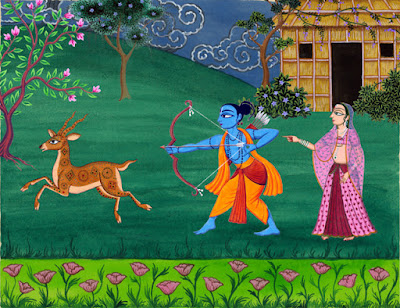Reading Guide. Shurpanakha does not appreciate being laughed at and rejected; she attacks, and she also tells her brother Khara about what has happened. You will read two versions of this part of the story: first, a prose account which tells about the confrontation between Surpanakha and Lakshmana and also the revenge of the rakshasas; next, you will read Dutt's verse version of just the first scene, when Surpanakha goes after Sita and Lakshmana attacks her.
Image: The illustration shows the gruesome moment when Lakshmana uses his sword to cut off Shurpanakha's nose. If you look at the full-size painting, you will see that it tells the story from right to left: on the right, Lakshmana confronts Shurpanakha, and then on the left he attacks her.
Source. The prose portion comes from Indian Myth and Legend by Donald A. Mackenzie (1913), and the verse portion comes from Ramayana, The Epic of Rama, Prince of India, condensed into English verse by Romesh Dutt (1899). [400 words]
Shurpanakha | 29. Lakshmana and Shurpanakha | Battle with Khara
Shurpanakha at once departed from Rama and went and found Lakshmana, who jested with her. Then the enraged rakshasa woman sprang towards Sita in jealous anger, but Rama thrust her back. Like to lightning, Lakshmana leapt forward with his sword and cut off the ears and nose of the evil-hearted Shurpanakha, whereat she shrieked and fled away, wailing like to the storm wind. The rocks answered back her awesome cries.
Shurpanakha hastened to one of her brothers who was named Khara, and when he saw her disfigured and bleeding, he cried, “None but a Celestial could have done this deed. This day will I drink the blood of Indra as a crane drinks milk and water.”
Then Shurpanakha related what had taken place and said, “Rama and Lakshmana attacked me to protect the woman Sita, whose life-blood I desired to drink. I entreat thee to bring her to me now.”
Khara called upon fourteen rakshasas and commanded them to capture the three royal hermits who dwelt in Dandaka jungle. They hastened away and Shurpanakha went with them, but soon she returned wailing because Rama had slain the rakshasas with celestial arrows.
Khara immediately called upon his brother Dushana, saying, “Assemble an army of fourteen thousand rakshasas and bring my weapons and my chariot with white horses for, verily, this day I must kill the hateful Rama.”
~ ~ ~
Torn by anger strong as tempest thus her answer she addrest,
"Are these mocking accents uttered, Rama, to insult my flame?
Feasting on her faded beauty dost thou still revere thy dame?
"But beware a raksha's fury and an injured female's wrath:
Shurpanakha slays thy consort, bears no rival in her path!"
Fawn-eyed Sita fell in terror as the raksha rose to slay,
So beneath the flaming meteor sinks Rohini's softer ray,
And, like Demon of Destruction, furious Surpanakha came;
Rama rose to stop the slaughter and protect his helpless dame.
"Brother, we have acted wrongly, for with those of savage breed,
Word in jest is courting danger — this the penance of our deed.
"Death perchance or death-like stupor hovers o'er my loved dame;
Let me wake to life my Sita; chase this female void of shame!"
Lakshman's anger leaped like lightning as the female hovered near.
With his sword the wrathful warrior cleft her nose and either ear.
Shurpanakha in her anguish raised her accents shrill and high,
And the rocks and wooded valleys answered back the dismal cry.
Khara and the doughty Dushan heard the far-resounding wail,
Saw her red disfigured visage, heard her sad and woeful tale!
Shurpanakha | Lakshmana and Shurpanakha | Battle with Khara




